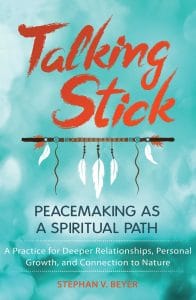
 Talking Stick: Peacemaking as a Spiritual Path, by Stephan V. Beyer
Talking Stick: Peacemaking as a Spiritual Path, by Stephan V. Beyer
Bear and Company 9781591432579, 192 pp., 2016
There aren’t many books I think everyone should read, but this is one of them. Simply, if we all read Talking Stick and managed to take away something from it, everything would change.
Author Stephan V. Beyer has worked as a peacemaker, and with peacemakers for many years and brings deep knowledge and vast experience to this subject to show us how we can all work to bring peace into the world. Talking Stick outlines a hard path calling for self-discipline, courage and determination. Peace is not made easily, but the tools here will help anyone who wants to be part of peacemaking.
Beyer begins the book by identifying three aspects of mainstream modern culture that are at odds with peace:
We have buried our true selves under years of cultural conditioning that has made us view our relationships in hierarchical, transactional and punitive terms.1
Much of the book is involved with unpacking these preconceptions and demonstrating how to work without hierarchy, how to take the assumptions of commerce out of relationships and how to manifest restorative justice instead of punishment.
The thing about systems of punishment is that they don’t solve systemic problems. Most systems don’t tackle the smaller problems that lead to the big ones, the broken relationships that lead to criminality and violence. We do nothing about rebuilding damaged relationships, and we do nothing to bring people who have messed up or made terrible mistakes back into good relationship with their communities.
What Beyer advocates for is this: the council circle and the talking stick. He relates stories that demonstrate the power of just speaking and listening, and the way this will lead to restoration and healing solutions. To my relief, he was very clear that there are some things that can’t be reliably dealt with by sitting those involved down with a talking stick — he specifically identifies rape and torture as being experiences where the victim cannot then sit down with the perpetrator to talk about it. Beyer does offer some interesting alternatives though — that victims and perpetrators who experienced these things with other people might sit in circle together productively.
It’s a fascinating book. There’s a lot of information about how to establish council circles and to work with them — something I think any Pagan group can usefully explore. I’ve been part of circles and rituals that passed talking sticks — not for conflict resolution but for sharing — and the results are powerful. There’s inspiration here for people who want to use the methods of the talking stick without being able to sit other people down in circles. Beyond that, there’s a wealth of broader thinking about ways to approach encounters with anything other than ourselves, that opens the way to cultivating peaceful and nourishing relationships.
Talking Stick: Peacemaking as a Spiritual Path is an easy book to read: it’s not long, it’s very clear; the writing is precise and accessible; the author warm, human, encouraging and accepting. It sets realistic expectations and encourages — in the most literal sense of seeking to make readers more courageous. For anyone looking to practice peace within a Pagan path, Talking Stick is a must-read. The approach has something of an animist flavour to it. There is mention of ritual, but everything here can be adapted to sit within whatever you already do.
Please, read this book.
- p. 2 [↩]








